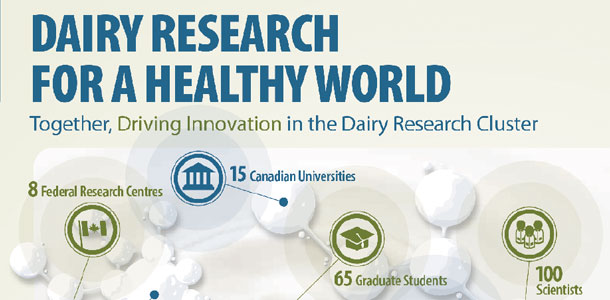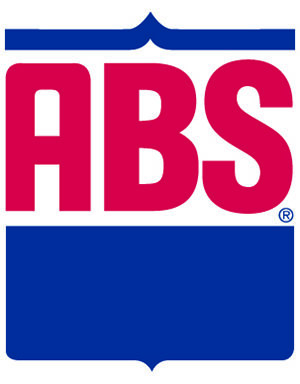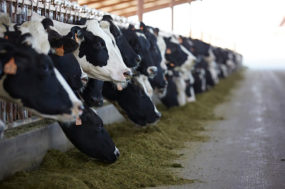Project: Improving hoof health in Canadian dairy farms
Targeted outcomes: The objectives of this activity are to organize and use hoof health data collected by hoof trimmers in the normal course of their work into a coherent and sustainable national database, and to develop herd management tools and genetic/genomic evaluations to improve hoof health in Canada.
In human nutrition and health …
Lead: Dr. Denis Roy, Université Laval
Collaborators: M. Lessard, AAFC, Sherbrooke; C. Asselin, Université de Sherbrooke; S. Gauthier, A. Lagacé, Y. Pouliot, Université Laval; A. Marette, Centre de recherche de l’Institut universitaire de Cardiologie et de Pneumologie de Québec; and Y. Boutin, Transbiotech
Project: Consumption of dairy products may counteract obesity and cardiometabolic diseases
Targeted outcomes: The team will test their hypothesis that consuming fermented dairy products (milk, cheese and yogurt) can control gut microbes and the level of intestinal inflammation, hence limit the spread of inflammation to peripheral tissues and reduce the development of obesity.
Click here or on the image above to view it at full size in a new window. (PDF, 2.1MB )
Their scientific evidence could support a growing body of evidence that suggests milk and dairy products are healthy food choices that can help counteract obesity and cardiometabolic diseases like Type 2 diabetes and cardiovascular disease.
In sustainable milk production …
Leads: Dr. Hélène Lapierre, Agriculture and Agri-Food Canada, Sherbrooke; and Dr. Lorraine Doepel, University of Calgary
Collaborators: D. Ouellet, J. Renaud, D. Bournival, M. Léonard, S. Dallaire, Agriculture and Agri-Food Canada, Sherbrooke; D. Pellerin, Université Laval; D. Lefebvre, Valacta; J. Cant, J. France, University of Guelph; M. Hanigan, Virginia Tech; M. Van Amburgh, Cornell University; and G.E. Lobley, Rowett Institute of Nutrition and Health
Project: Balancing dairy rations for protein, filling the gaps and updating formulation models to reduce protein intake sensibly
Targeted outcomes: The team will seek to improve dairy cattle feed formulation models in an effort to increase the efficiency of protein (amino acid) use, allowing dairy farmers to reduce protein in dairy rations.
This can help dairy farmers improve their environmental sustainability and increase profitability. Reducing the protein in dairy rations from the current average of 18.1 percent to the doable 16.5 percent would reduce annual nitrogen excretion by 17,000 tons and save $1.01 per hectolitre of milk, for a yearly economy of $77.5 million. PD
Dairy Farmers of Canada (DFC) is the national policy, lobbying and promotional organization representing Canada’s farmers. DFC works to support sustainable dairy production; facilitate solutions to provincial/national challenges; provide credible research of dairy products on a national basis; and create innovative ways to grow the market.









